You might presume that UConn’s main campus, tucked away in pastoral northeastern Connecticut, lay dormant over the summer months. Think again. Were you to peek into classrooms across campus in mid-July, you would be surprised to come across a few rather unusual sights:
… A Connecticut police officer enthralling a crowd of science teachers with real-life criminal cases as they learn how to dust for fingerprints and test for DNA evidence;
… Four young men presenting a lively spoken word performance, centered on improving education for economically disadvantaged students, to teachers and principals;
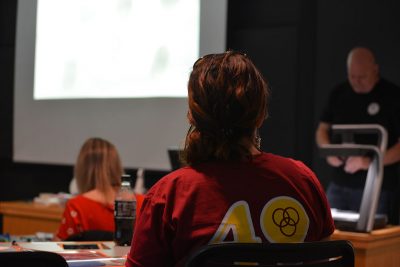
… Educators from India, Italy, Brazil, Qatar, and Switzerland teaming up for a surprisingly entertaining math lesson led by the wittiest individual in the room, a sprightly octogenarian math whiz who liberally sprinkles her lecture with wisecracks.
These are just a few of the scenes you would catch at what is known as Confratute, an annual, weeklong event sponsored by the Renzulli Center for Giftedness, Creativity, and Talent Development at the University of Connecticut’s Neag School of Education. Arguably the most global initiative in all of UConn’s history, Confratute has, since 1978, drawn a total of more than 30,000 educators from around the world to the University’s Storrs campus to gain insight into research-based strategies intended to engage all types of students in learning.
“Confratute is a kind of gathering together of people who think there has got to be a different way — I would say a better way — of making schools more engaging, more enjoyable, and more exciting.”
— Board of Trustees Distinguished Professor
Joseph Renzulli
Celebrating its 40th anniversary this July, Confratute earlier this month brought together 600-plus educators from more than a dozen countries for nearly 50 sessions covering everything from how to incorporate CSI forensic science tactics into the classroom to creative storytelling using kinesthetics, music, and mime.
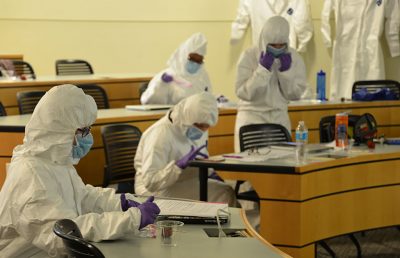
“Confratute is a kind of gathering together of people who think there has got to be a different way — I would say a better way — of making schools more engaging, more enjoyable, and more exciting,” says Board of Trustees Distinguished Professor Joseph Renzulli, a longtime educational psychology professor in the Neag School and Confratute’s co-founder.
Renzulli, after whom the Renzulli Center is named, established this “gathering” four decades ago with Board of Trustees Distinguished Professor and Letitia Neag Morgan Chair in Educational Psychology Sally Reis. From the outset, Renzulli says, he and Reis wanted to make it unlike any other professional development conference or training — and set out to create part conference, part institute, with “a great deal of fraternity in between.”
‘The Most Energizing Learning Experience I’ve Ever Had’
Early in his career, working as a middle-school math and science teacher in his home state of New Jersey, Renzulli says he found that many of his students were “smarter” than him. As a professor in higher education years later, he says he witnessed the same attribute in his doctoral students.
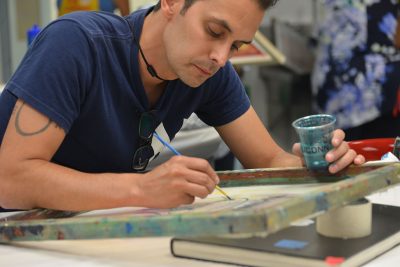
“Half of the doctoral students who come through the door are smarter than me,” he says. “So I can’t teach them everything that I know, but I can teach them how to develop an investigative and creative mindset — and that is what I did with [my middle-school students]; I got them involved in many different projects and hands-on activities.”
Keeping these early-career experiences in mind, Renzulli sought, in establishing Confratute, to share with educators a wealth of effective instructional approaches used in the field of gifted education — still a somewhat peripheral academic discipline 40 years ago — as well as to show how these approaches could be applied successfully across all types of students.
“At that time, most gifted education was all about acceleration and advanced courses covering material faster and in greater depth. I’ve never argued against that,” says Renzulli. “However, it did not promote the kinds of experiences I had as a teacher, where kids [of all levels] got interested in investigative projects.”
“The collaboration and synergies that happened over the course of the week were amazing. It is the most energizing learning experience I’ve ever had, both times I attended.”
— Karen Kraeger, elementary gifted specialist,
Cobb County (Ga.) Schools
The intention of Confratute was not to advocate for doing away with any school’s regular curriculum, he says, but to bring together teachers and help them find ways to “jazz up” curricula in a way that would appeal to students at all levels. Confratute, he hoped, would show educators how to make school the kind of place that encouraged students to pursue their personal interests. “Schools should be places for talent development,” he says.
And even beyond the end goal of engaging all students, Renzulli wants Confratute to engage all teachers. “If you don’t enjoy teaching, you’re not going to get engaged; you’re not going to enjoy the act of learning,” he says.
For Confratute devotees, the program structure, which invites attendees to take part in dedicated weeklong sessions that concentrate on active learning, helps set it apart from other professional development opportunities in the realm of education. In addition, a focus on the Schoolwide Enrichment Model, developed by Renzulli and Reis more than 30 years ago, helps participants plan how to implement enriching and engaging programs in their schools and districts.
“The weeklong format allows for extensive time to dig deeply into a topic for thorough explanation … enough time to have a paradigm shift,” says Karen Kraeger, an elementary gifted specialist for Cobb County Schools, located outside of Atlanta, who this summer attended Confratute for the second time.
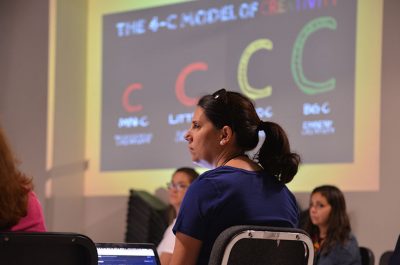
“The extended time allows a group of people to grow, bond, and develop into a community of learners focused on improving learning for students,” she adds. “The collaboration and synergies that happened over the course of the week were amazing. It is the most energizing learning experience I’ve ever had, both times I attended.”
“At a more traditional conference,” says Melissa Thom, a longtime Confratute instructor and library media specialist in West Hartford, Conn., “you get a short overview of many different topics each day and, after three to four days, one often leaves feeling energized, but overwhelmed with all the new ideas and unsure of how to actually make something happen.”
In contrast, she says, Confratute’s weeklong strands “enable participants to explore a topic of interest much more deeply. … They leave Confratute with a product and/or a plan for how to implement the new ideas in their educational situation in the fall. In addition, deeper relationships are developed among the educators in the strand due to the added time together spent learning and sharing.”
Not to mention “the combination of learning, teaching, socializing, networking, and overall feeling of collegiality” that she believes makes Confratute unique. Thom, who this summer led a session titled “Talent Development Opportunities in the Library Media Center,” has been participating in Confratute for nine years.
While this annual event has endured year after year with an ever-ardent following, the road to Renzulli and Reis sharing their innovative work certainly posed its own challenges along the way.
Changing the Definition of Giftedness
Renzulli, a pioneering force in the field of educational psychology, giftedness, and creativity for nearly half a century, has, in that time, helped change the face of gifted education. He is quick to admit that his viewpoint on gifted education “has always been a little bit different.” To him, intelligence and giftedness are not defined solely by test scores or high IQ, and all students should be given the opportunity to develop their gifted behaviors.
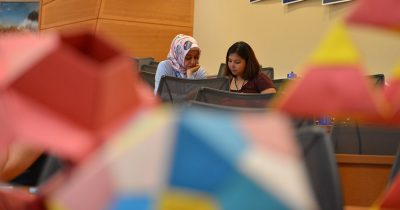
One of the major concepts he championed — and for which he was in fact criticized, early on — is the idea that educators can successfully apply teaching strategies used in gifted education to engage all students, in part by giving students freedom to choose the kinds of projects and topics they explore, based on their own personal interests.
“We believe that all students can benefit from enjoyable and challenging learning opportunities,” states Confratute’s website. “Learning is maximized when we consider each student’s abilities, interests, learning styles, and preferred modes of expression.”
Yet these perspectives were not always popular.
During Renzulli’s early years in academia, his ideas were rejected outright by his contemporaries, with one article he authored about his research receiving rejections from every major gifted education academic journal. Eventually, Phi Delta Kappan accepted the piece for publication in 1978; today, that article continues to stand as the most frequently cited publication in the field of gifted education.
“Prior to Joe’s work on the definition [of giftedness], most professional educators equated giftedness strictly with high IQ scores,” writes Thomas P. Hébert[1], a friend and former graduate student of Renzulli, now a professor of gifted education at the University of South Carolina. “Renzulli’s definition challenged this antiquated approach and enabled gifted ed programs to be open to children of poverty, children from bilingual backgrounds, and children of color.”
“It is unusual for innovative or revolutionary ideas to be easily accepted by most, especially at the beginning. People want to see proof that changing from the known will offer better outcomes,” says Kraeger, the two-time Confratute attendee. Renzulli “persevered with his ideas, putting them into practice and studying the outcomes. His ideas … are still as relevant and powerful today as they were initially. That is the sign of a truly transcendent thinker.”
“You leave Confratute with a network of like-minded individuals — a vital aspect in today’s educational world.”
— Melissa Thom, Confratute instructor
International Reach
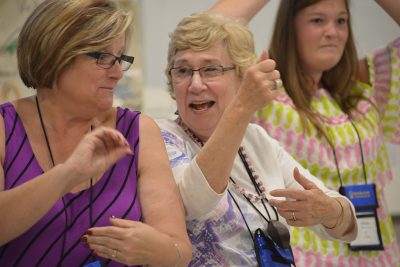
Under Renzulli’s visionary leadership, perhaps it is no wonder, then, that Confratute stands out from the crowd. In taking an approach unlike other professional development programs in education, in following an unconventional format, in bringing together a cast of colorful and keenly dedicated instructors, and even in touting a name that resists convention, Confratute continues to unite educators far and wide.
“You leave Confratute with a network of like-minded individuals — a vital aspect in today’s educational world, where educators who believe education should be joyful can often feel alone and isolated,” says longtime instructor Thom.
“Where else can you spend a week with so many of the eminent thinkers in education?” Kraeger says. “It is an experience unlike any other, one that is not to be missed.”
Even through Confratute’s decades-long evolution, from a yearly “gathering” at the UConn Storrs campus to an event with remarkable international reach, Renzulli, now in his 80s, has remained front and center at Confratute — “a kind of little oasis for people,” according to Renzulli, who affectionately calls Confratute supporters “positive malcontents who want to make a difference in their schools.”
With a career that now spans a near half-century, Renzulli has traveled around the globe many times over to share his research. He has won many accolades, advised doctoral students who have gone on to become prestigious researchers and experts in their field, has obtained more than $50 million in research grants, and is widely recognized as one of the world’s most influential psychologists. But ask what Renzulli considers his greatest legacy of such a long and storied career, and it is clear where his passion lies.
“I’ve published hundreds of articles and dozens of books, but when people ask what I feel is my major contribution, I say Confratute,” he says. “I’ve been able to reach more kids and more teachers serving more kids in schools around the country and around the world. This is what the theme of Confratute is all about.”
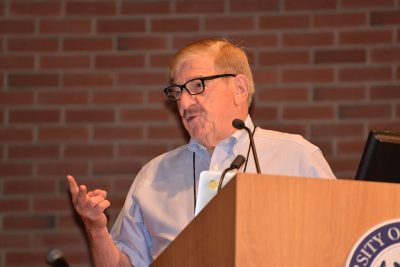
Watch the opening ceremony for 40th annual Confratute, with welcome remarks by Joseph Renzulli, Sally Reis, Education Commissioner Dianna Wentzell, and Dean Gladis Kersaint of the Neag School.
Read a blog post about personalized learning and the Schoolwide Enrichment Model, written by Superintendent Blane McCann of Omaha, Neb., a longtime Confratute attendee.
View the Confratute 2017 photo album.
 Facebook
Facebook
 Twitter
Twitter
 LinkedIn
LinkedIn
